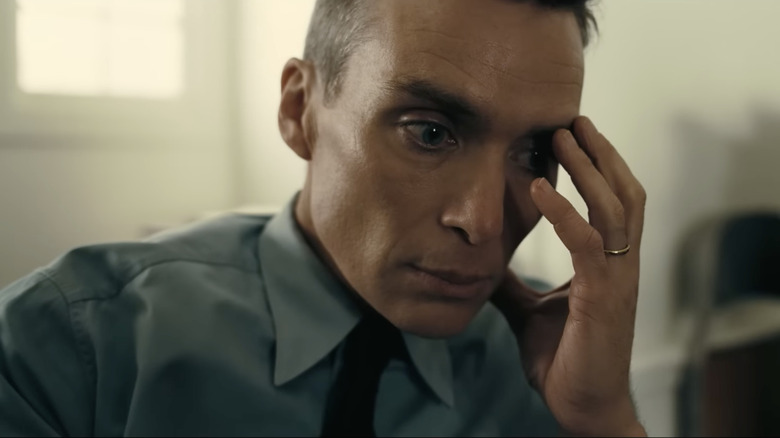Christopher Nolan's Oppenheimer Script Was Written In The First Person
If there's one thing Christopher Nolan is obsessed with, it's time. If there are two things he's obsessed with, it's time and dead wives subjectivity. His thrillers "Memento" and "The Prestige" lock you into their characters' points of view in precise and deliberate ways so as to make their third-act rug pulls all the more effective. Nolan's WWII thriller "Dunkirk" is likewise an experiment in impressionist moviemaking, portraying the Dunkirk evacuation from numerous perspectives spanning vastly different time frames. Even his vibes-heavy James Bond-riffing sci-fi actioner "Tenet" places you firmly in the shoes of its protagonist (the, uh, Protagonist) as he hops around the globe moving back and forth in time.
This trend will continue with "Oppenheimer," Nolan's biopic about the U.S. theoretical physicist and father of the atomic bomb, J. Robert Oppenheimer (as played by Cillian Murphy). "For me, everything's about structure and point of view," said Nolan, speaking to Empire Magazine. He explained:
"I wanted to really go through this story with Oppenheimer; I didn't want to sit by him and judge him. That seemed a pointless exercise. That's more the stuff of documentary, or political theory, or history of science. This is a story that you experience with him — you don't judge him. You are faced with these irreconcilable ethical dilemmas with him."
That certainly seems like a sensible approach. Oppenheimer's legacy is a subject that could fill an entire film on its own, so better to stay in the moment as he races to develop the first nuclear weapons during WWII, fully aware that any slight miscalculation on his end could end up having potential world-ending consequences (while also being aware of what might happen, should the Axis powers develop the bomb first). This even informed the way Nolan penned his script for the film.
'Odd thing to do'
Unlike his previous scripts (or most film scripts in general), Christopher Nolan wrote "Oppenheimer" in the first person. "I actually wrote in the first-person, which I've never done before. I don't know if anyone's ever done it before," Nolan admitted to Empire. It wasn't merely for his own entertainment, either. Most of "Oppenheimer" is in color and it's these sequences where "everything is told from Oppenheimer's point of view — you're literally kind of looking through his eyes," as the filmmaker put it. This is in contrast to the scenes in black-and-white, which are more objective in their depiction of the movie's historical events.
Telling a story that way could get rather complicated very quickly, Nolan noted, which is the reason he penned the script the way he did:
"Yeah. I know. Odd thing to do. But it was a reminder to me of how to shoot the film. It was a reminder to everybody involved in the project, 'Okay, this is the point of view of every scene.'"
Cillian Murphy has talked about this before, confessing that it took him "a minute, maybe a bit more than a minute" to figure out the method for Nolan's latest feat of convoluted storytelling. Then again, it wouldn't be a proper Christopher Nolan creation if he didn't try and find a way to continue his career-long investigation of how our own individual experiences inform our own understanding of the world and existence at large. In that respect, "Oppenheimer" is shaping up to be one of the more cerebral dad movies we've gotten in a while.
You can catch "Oppenheimer" in theaters starting on July 21, 2023, but you'll have to leave the kiddos at home. Or, better yet, take them to go see "Barbie" sometime before or after.

